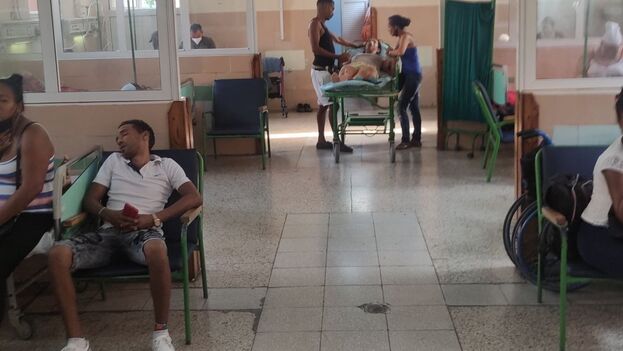
![]() 14ymedio, Juan Diego Rodríguez, Havana, 7 November 2022 — Today the General Calixto García University Hospital in Havana is far from being the center of prestige that it once was. Even less does it honor the propaganda that, on official pages, sells its services as “high quality.”
14ymedio, Juan Diego Rodríguez, Havana, 7 November 2022 — Today the General Calixto García University Hospital in Havana is far from being the center of prestige that it once was. Even less does it honor the propaganda that, on official pages, sells its services as “high quality.”
The hospital, one of the oldest in the capital, is rather the epitome of the situation of hospitals in Cuba. While the Government promotes its powerful Medical Services Marketer as a desperate tool to attract tourism, which still is avoiding the Island, hospital centers and doctors’ offices for Cubans are sinking into squalor, corruption and unhealthiness.
Sandra remembers the week she spent at the Calixto García with her mother, Luisa, as a nightmare. Both resisted going to the doctor, like so many other Cubans, until the woman, about seventy years old, began to run out of breath, and the chest pain she suffered became unbearable.
They took it for granted that they would have to travel by taxi and not by ambulance, given the fuel shortage. What outraged both, as soon as they entered, was that there were not even stretchers. “I had to look for a stretcher and move it throughout the hospital,” Sandra tells 14ymedio. The shortage of personnel, precisely, is something widespread in health services due, above all, to the unstoppable migration.
The wait to go to the consultation was not in a room, but in the middle of the corridor, where the smell of disinfectant was overshadowed by the bad smells and urine coming from the bathrooms. “My nose is very sensitive,” says Sandra, “and that was unbearable.”
Right there, they observed a whole parade of patients, many of them with severe dengue fever, which this season has ravaged the Island. “Everyone was waiting there, without any separation, even a lady full of blisters, as if she had monkeypox,” the young woman continues. “Without any privacy or anything like it, on a stretcher in the middle of the hallway, they pumped the stomach of a woman who had overdosed with Diazepam. The woman said she wanted to leave all this shit. What can I say, not everyone is strong.”
The worst, however, was yet to come. Luisa, diagnosed with pneumonia, spent the night alone in the hospital. Her daughter, when she went to visit her the next day, observed that her arm was swollen. “It’s very common, they told me, that the needle comes out of the vein and the serum accumulates under the skin,” she says. “The problem is that the nurse told me there were no more needles anywhere and they couldn’t change it.”
Sandra soon knew that “no side” was defeated with a little will… and money under the table. The young woman first approached the supervisor and the deputy director of the hospital. “They swore that they couldn’t change it, that I had to put up with it.” When she turned around, already resigned, an employee of the center, who witnessed the scene, approached her and said: “I can solve that for you, tell me what bed she’s in, wait for me there, I’m going to bring it to you.” Sandra gave her 200 pesos, and another 200 to the nurse who, in collusion with the assistant, gave Luisa the new needle for the drip line.
“They also offered me Rocephin [the antibiotic specifically prescribed for her mother] at 250 pesos per vial, and if I needed a person to stay with my relative, they would also solve it for me,” Sandra explains.
And she adds: “With all that, they tell you any amount, they lie constantly. One day they didn’t give my mother the antibiotic and told her some story. In the morning, in another shift of nurses, I complained, and one said: ’Yes, they gave her the Rocephin, because here in the book it’s recorded’.”
Sandra can’t explain “how a simple hospital employee has the needles, medicines, everything, and yet, the bosses assured me that there was nothing in the hospital. Everything is pure corruption; Cuban hospitals have become a horror.”
As if that were not enough, one morning, several patients’ mobile phones were stolen. “In the same room, in 24 hours, there were three similar robberies,” says Sandra. “If it wasn’t an employee, it was someone disguised as an employee.”
In the midst of the sufferings of their relatives, people were forced to go to an Etecsa (State telecommunications company) office, with the identity card of the patients and a medical certificate stating that they were hospitalized, so that the state-owned company could cancel the phone number and allow them to take out a new line.
Sandra is telling all this, she says, “so that people have an idea of what someone who has a sick relative in this country has to go through. Going to a hospital has become a disaster.”
Translated by Regina Anavy
____________
COLLABORATE WITH OUR WORK: The 14ymedio team is committed to practicing serious journalism that reflects Cuba’s reality in all its depth. Thank you for joining us on this long journey. We invite you to continue supporting us by becoming a member of 14ymedio now. Together we can continue transforming journalism in Cuba.
